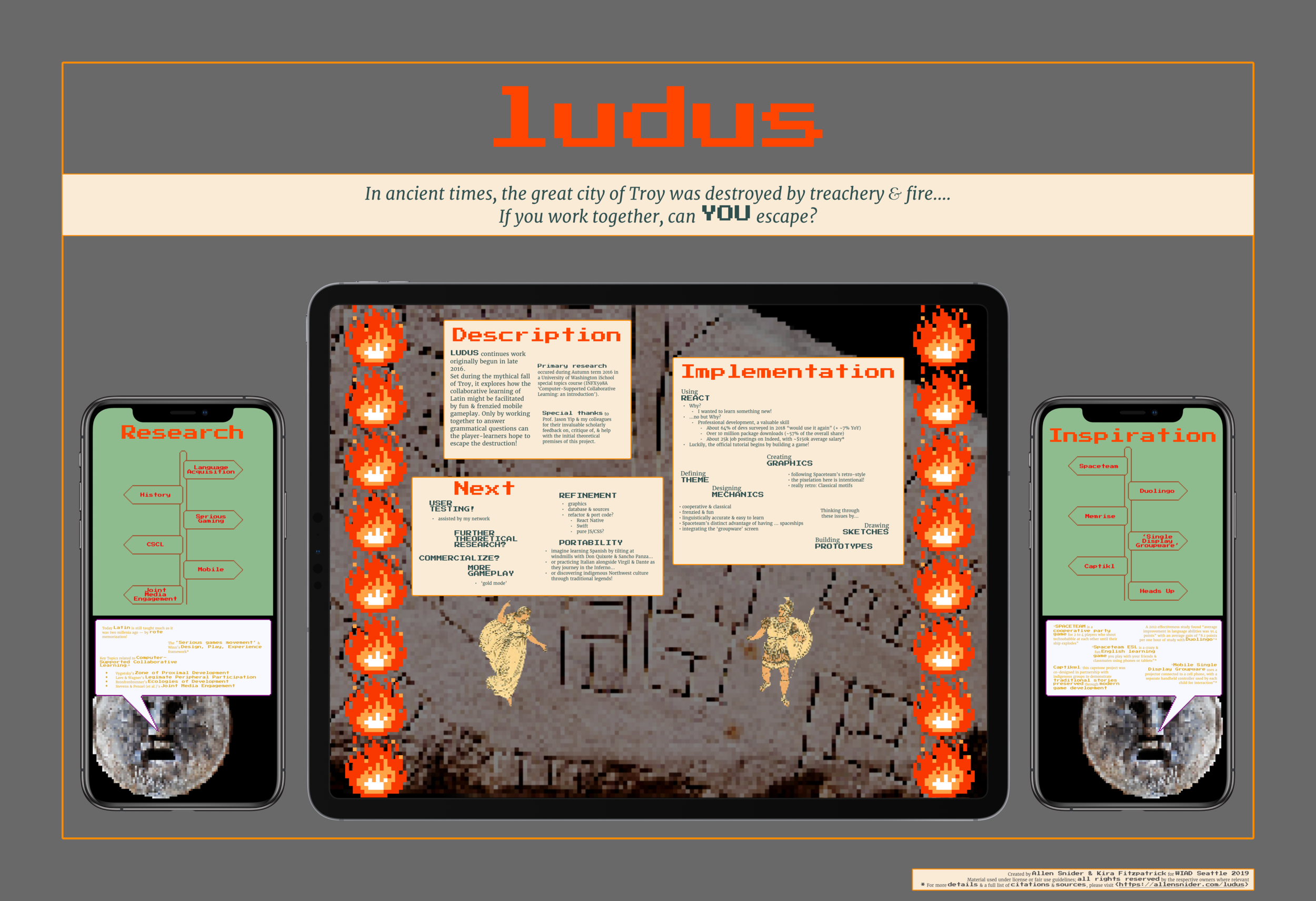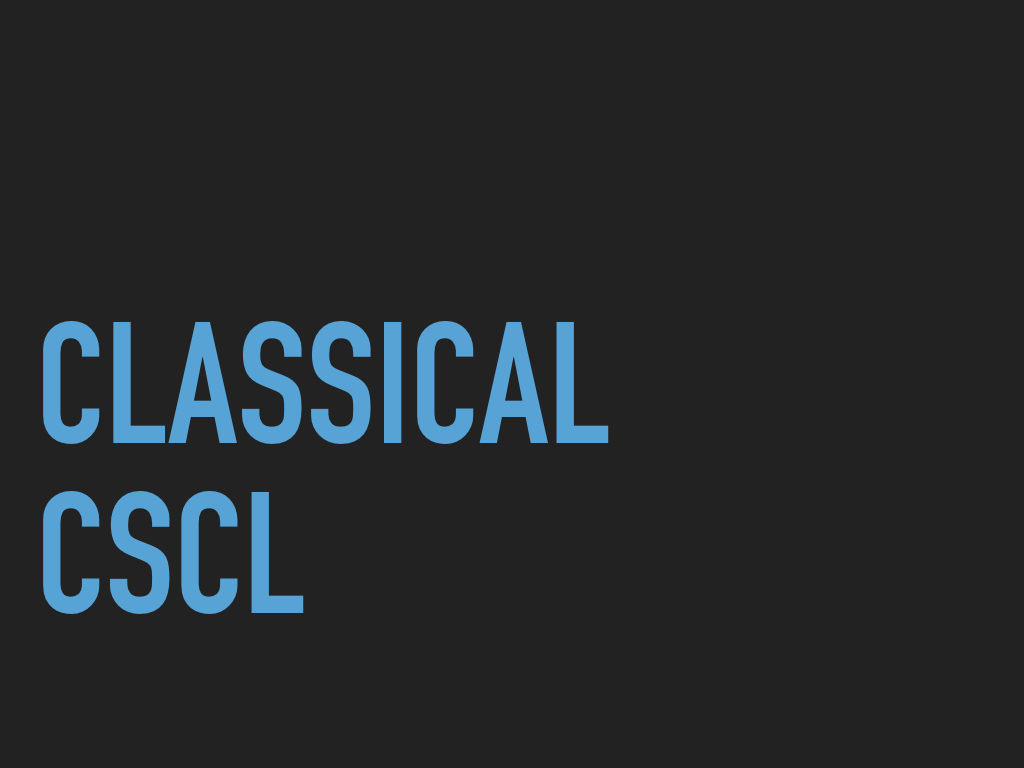
Ludus
In ancient times, the great city of Troy was destroyed by treachery & fire.... If you work together, can YOU escape?
Ludus continues work originally begun in late 2016. Set during the mythical fall of Troy, it explores how the collaborative learning of Latin might be facilitated by fun & frenzied mobile gameplay. Only by working together to answer grammatical questions can the player-learners hope to escape the destruction!
Primary research occurred during Autumn term 2016 in a University of Washington iSchool special topics course (INFX598A ‘Computer-Supported Collaborative Learning: an introduction’). Special thanks to Prof. Jason Yip & my colleagues for their invaluable scholarly feedback on, critique of, & help with the initial theoretical premises of this project.
Feel free to check out the ongoing code wrangling & development over at https://github.com/rallensnider/ludus

Poster
As presented at World Information Architecture Day — Seattle, on 23 Feb 2019 #WIAD19
Created by Allen Snider with assistance from Kira Fitzpatrick.

Sources
2016 Research - Works Referenced
Bronfenbrenner, U. (1977). Toward an experimental ecology of human development. American psychologist, 32(7), 513.
Henderson, V., Lee, S., Brashear, H., Hamilton, H., Starner, T., & Hamilton, S. (2005, June). Development of an American Sign Language game for deaf children. In Proceedings of the 2005 conference on Interaction design and children (pp. 70-79). ACM.
Huang, K., Smith, J., Spreen, K., & Jones, M. F. (2008, June). Breaking the sound barrier: designing an interactive tool for language acquisition in preschool deaf children. In Proceedings of the 7th international conference on Interaction design and children (pp. 210-216). ACM.
Idehara, N., & Ushirogi, T. (2012, March). Ethereal flashcards: contextual vocabulary learning tool using indoor wireless positioning. In Proceedings of the 2012 Virtual Reality International Conference (p. 29). ACM.
Jain, M., Birnholtz, J., Cutrell, E., & Balakrishnan, R. (2011, August). Exploring display techniques for mobile collaborative learning in developing regions. In Proceedings of the 13th International Conference on Human Computer Interaction with Mobile Devices and Services (pp. 81-90). ACM.
Kozima, H., & Ito, A. (1998, January). Towards language acquisition by an attention-sharing robot. In Proceedings of the Joint Conferences on New Methods in Language Processing and Computational Natural Language Learning (pp. 245-246). Association for Computational Linguistics.
Larsson, S., & Cooper, R. (2009, March). Towards a formal view of corrective feedback. In Proceedings of the EACL 2009 Workshop on Cognitive Aspects of Computational Language Acquisition (pp. 1-9). Association for Computational Linguistics.
Looi, C. K., Seow, P., Zhang, B., So, H. J., Chen, W., & Wong, L. H. (2010). Leveraging mobile technology for sustainable seamless learning: a research agenda. British Journal of Educational Technology, 41(2), 154-169.
Mayberry III, M. R., Crocker, M. W., & Knoeferle, P. (2005, June). A connectionist model of language-scene interaction. In Proceedings of the Workshop on Psychocomputational Models of Human Language Acquisition (pp. 36-44). Association for Computational Linguistics.
Michaud, L. N., McCoy, K. F., & Pennington, C. A. (2000, November). An intelligent tutoring system for deaf learners of written English. In Proceedings of the fourth international ACM conference on Assistive technologies (pp. 92-100). ACM.
Rankin, Y. A., McNeal, M., Shute, M. W., & Gooch, B. (2008, August). User centered game design: evaluating massive multiplayer online role playing games for second language acquisition. In Proceedings of the 2008 ACM SIGGRAPH symposium on Video games (pp. 43-49). ACM.
Rankin, Y. A., Morrison, D., McNeal, M., Gooch, B., & Shute, M. W. (2009, April). Time will tell: In-game social interactions that facilitate second language acquisition. In Proceedings of the 4th international conference on foundations of digital games (pp. 161-168). ACM.
Rankin, Y. A. (2016, May). Diversity by Design: Female Students' Perception of a Spanish Language Learning Game. In Proceedings of the 2016 CHI Conference Extended Abstracts on Human Factors in Computing Systems (pp. 670-679). ACM.
Robertson, S. A., & Lee, M. P. (1995). The application of second natural language acquisition pedagogy to the teaching of programming languages—a research agenda. ACM SIGCSE Bulletin, 27(4), 9-12.
Roschelle, J., Rosas, R., & Nussbaum, M. (2005, May). Towards a design framework for mobile computer-supported collaborative learning. In Proceedings of the 2005 conference on Computer support for collaborative learning: learning 2005: the next 10 years! (pp. 520-524). International Society of the Learning Sciences.
Shepherd, J. J., Doe, R. J., Arnold, M., Cheek, N., Zhu, Y., & Tang, J. (2011, March). Lost in the Middle Kingdom: a second language acquisition video game. In Proceedings of the 49th Annual Southeast Regional Conference (pp. 290-294). ACM.
Shepherd, J. J., Doe, R. J., Arnold, M., Zhu, Y., & Tang, J. (2011, June). A different approach to teaching Chinese through serious games. In Proceedings of the 6th International Conference on Foundations of Digital Games (pp. 304-306). ACM.
Takeuchi, L., & Stevens, R. (2011). The New Coviewing: Designing for learning through Joint Media Engagement. New York: The Joan Ganz Cooney Center at Sesame Workshop.
Vygotsky, L. S. (1930). Mind in Society: The development of higher psychological processes. Cambridge, MA: Harvard University Press.